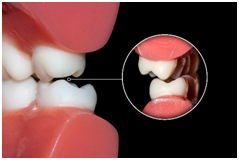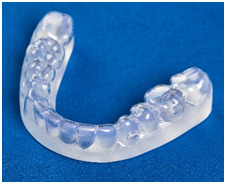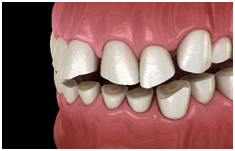Has someone told you that you grind your teeth in your sleep? Do you have headaches and jaw pain caused by you clenching your teeth?
If so, a custom-made night guard might be the answer.
- What is bruxism?
 Bruxism is the medical term for grinding or clenching your teeth and jaws. Bruxism is a common condition and normally occurs while you are asleep or at times of high stress. As clenching and grinding is normally done unconsciously many people have no idea, they do it until they are told by their dentist. Over time, grinding your teeth in your sleep causes extensive damage to the structure and enamel of the teeth, which can lead to decay, chips and breaks and increased sensitivity. It can also cause headaches, disrupt your sleep, and cause pain in the jaw, face, and neck.
Bruxism is the medical term for grinding or clenching your teeth and jaws. Bruxism is a common condition and normally occurs while you are asleep or at times of high stress. As clenching and grinding is normally done unconsciously many people have no idea, they do it until they are told by their dentist. Over time, grinding your teeth in your sleep causes extensive damage to the structure and enamel of the teeth, which can lead to decay, chips and breaks and increased sensitivity. It can also cause headaches, disrupt your sleep, and cause pain in the jaw, face, and neck.
- What is a custom night guard?
 A night guard looks similar to the trays used for teeth whitening and sits over the teeth to protect them from grinding or clenching. The device may also be referred to as an occlusal splint, occlusal guard, or bite splint. A night guard does not stop you grinding and clenching. However, it does shield and cushion the teeth from wear and damage.
A night guard looks similar to the trays used for teeth whitening and sits over the teeth to protect them from grinding or clenching. The device may also be referred to as an occlusal splint, occlusal guard, or bite splint. A night guard does not stop you grinding and clenching. However, it does shield and cushion the teeth from wear and damage.
- Why wear a night guard?
Your dentist may recommend that you wear a night guard to help you with morning headaches, for TMJ jaw pain relief, to prevent damage to your teeth, veneers, crowns, and other restorations. Although a night guard is not the only treatment for bruxism or temporomandibular joint pain, it is an affordable, convenient, and non-invasive treatment option. A properly fitted night guard shifts the jaw and teeth into proper alignment, which can alleviate jaw tension, headaches, pain, and other symptoms of temporomandibular joint syndrome.
- Why is it important to get a night guard for jaw clenching?
 Ignoring your bruxism symptoms can lead to serious dental issues requiring expensive treatments. For example, bruxism is a leading cause of root canals. Teeth grinding also increases the risk of enamel erosion and cavities, with people who regularly grind their teeth experiencing up to 2 millimetres of enamel erosion by their 20s, increasing to 5 millimetres plus in their 40s and 50s.
Ignoring your bruxism symptoms can lead to serious dental issues requiring expensive treatments. For example, bruxism is a leading cause of root canals. Teeth grinding also increases the risk of enamel erosion and cavities, with people who regularly grind their teeth experiencing up to 2 millimetres of enamel erosion by their 20s, increasing to 5 millimetres plus in their 40s and 50s.
- What is the process for getting a custom night guard?
The dentist will first take an impression of your teeth. The impression is used by the laboratory to create the night guard. Once finished the dentist will ensure that it fits properly. Then all you have to do is wear the guard as you sleep. It may feel a little odd at first, but most of our patients get used to wearing their night guard quite quickly.
 If you are experiencing tooth damage, jaw pain, or other symptoms of bruxism, call Valley Dental Practice on 01255 2203222 to schedule a consultation with one of our experienced dentists. If your dentist determines that your issues are caused by teeth grinding or clenching, we will help you find the right night guard or bruxism treatment for you.
If you are experiencing tooth damage, jaw pain, or other symptoms of bruxism, call Valley Dental Practice on 01255 2203222 to schedule a consultation with one of our experienced dentists. If your dentist determines that your issues are caused by teeth grinding or clenching, we will help you find the right night guard or bruxism treatment for you.





